QuestionMy cat is a 6-yr.-old North American shorthair--loving, trusting, friendly, good with children and our other cat, not to mention beautiful. We bought him, our first and only purebred, from a breeder. Her cattery, the basement of her split level house, was very smelly. In fact, so was her house. As soon as we brought our kitten home, he immediately marked our house in almost every corner available. Once he was fixed, this behavior persisted. Our vet rechecked him and said yes, the surgery worked, that there are just some cats like this. We have tried everything to correct the behavior except frightening or punishing the cat. We have bought many deterrant products, used calming sprays that come out of a steamer, spayed recommended unappealing perfumes, and once kept the cat in a separate room with litter and food for a week to attach him more to the litter pan. By the way, he does use the litter pan and does groom himself well. We also have barracaded all doorways and edges of rooms with box lids, but he gets around them. At this point we are desperate and want to avoid putting the cat to sleep; we can't easily place him in anyone else's home, and he can't go outside on a farm, for example because he's declawed and too trusting. Do you have any extraordinarily good news for us that will allow us to keep our sweet cat with us? Thank you so much for your time.
AnswerHi Carole,
I need a bit mroe information; has he been spraying consistently since you brought him home as a kitten? You say he is 6 years now and you got him as a kitten. Have you been tolerating spraying for 6 years or is this something that has come and gone? What do you feed your cat? When you moved into your house did a previous resident have pets (if so there may be urine smells that you can't detect but your cat can). IS he spraying (backing up to a wall and spraying a mist of urine out backwards) or squatting and peeing in a puddle? Spraying is more likely to be behavioral (but can eb medical) whereas peeing normally is almost always a medical problem.
First thing I always do, even if the urination seems probably territorial, is to have a urinalysis done to rule out problems like bladder infections or urinary tract cyrstals. These problems can be chronic and cause extreme discomfort, burning and pain during urination which leads to the cat going outside the box some or all of the time as a plea for help or because they associate the litterbox with pain. Cats often show little signs of being ill other than going outside the box, although sometimes they lick their genital area excessively.
You should have a urinalysis done on your cat right away before proceeding with any other program, because 99% of the time there is a medical problem involved. If the vet says he doesn't think it is medical ask him to do it anyway, or ask another vet! One of may cats was urinating around the house many years ago and 2 of the vets I took him to tried to prescribe "kitty prozac" and insisted it was behavioral. Finally I took him to another vet who said they couldn't find an infection but prescribed antibiotics anyay, and he stopped peeing after 2 days. I gave him the rest of the antibiotics (always give the full course never stop early) and he was fine.
Bladder infections and crystals can be corrected by antibiotics and diet changes. Sometimes I even recommend giving antibiotics for a few weeks just to see if it helps, because sometimes bladder infections can be difficult to detect. I recommend feeding a high quality food that promotes urinary acidity to prevent infections and crystals. I recommend Royal Canin Adult or Wellness Adult cat food, which are more expensive but much higher quality resulting in better health for your cat - plus you don't ahve to feed as much because there is less filler and more digestible meat.
Also what are the brands of calming products you have used? The only one I have had success with is Feliway spray, which needs to be applied every 4 days.
You have to ensure that all previous urine smell (from your own cat and from possible previous residents) is gone or the cat will simply continue marking the spots. Even if you have cleaned it and you can't smell it your cat still can. You have to use an enzyme product that breaks down cat urine at the molecular level so he cannot smell it any more. I like Nature's Miracle available in many pet stores (I think Petsmart and Petco carry it online).
What you need to do to find all the stink spots is get a black light (sold in pet stores for this purpose) and turn off the lights in your house, shine the black light around. Urine spots (even if cleaned up) will glow under the black light. Soak each spot thoroughly with Nature's Miracle and allow it to dry slowly. The smell will be gone to your cat when the area is dry. Then once it's dry you can apply Feliway to the area as an extra measure.
You may want to contain your in a single room (like the bathroom or one bedroom) while you de-scent the rest of the house for a few days and apply Feliway afterwards. Then start allowing him out into the rest of the house after you are sure the previous marking spots are gone.
Try a litter such as Worlds Best Cat Litter (www.worldsbestcatlitter.com) or Cat Attract (http://www.preciouscat.com/WebPages/catattract.html) which contains ingredients that attract cats and a sandy texture that they enjoy. Avoid any scented litter especially pine litters, cat urine reacts with them to create fumes that drive many cats away from the box. Always use unscented litter. Make sure the box is cleaned at least once, preferably twice a day (cat are clean anddon't want to step in their own feces or urine) and the box is located in a private, quiet place. Also nmake sure the box is large enough that he can easily turn around, and if it's covered, stand up straight.
If worst came to worst and you couln not completely stop the urination, you could consider fitting your cat with a diaper for incontinent dogs. They make them in small sizes that fit cats. I think it would be a shame to authanize such a wonderful cat for this problem. Also it will help teach your children tolerance and love despite flaws.
Other problems to be aware of: if your cat is declawed that could be part of the problem, declawed cats are farmore likely to develop litterbox aversion due to pain in their paws and the coarse texture of litter hurting them.
Please contact me back if you need more ideas and advice. Often spraying can at least be reduced to something that happens very infrequently.
-Tina

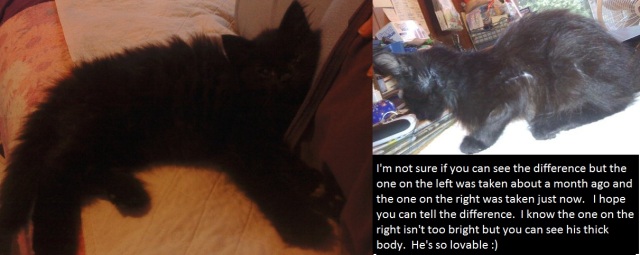 Kitten lossing weight drastically
QuestionTubby before and after
QUESTION: Hello.
Kitten lossing weight drastically
QuestionTubby before and after
QUESTION: Hello.
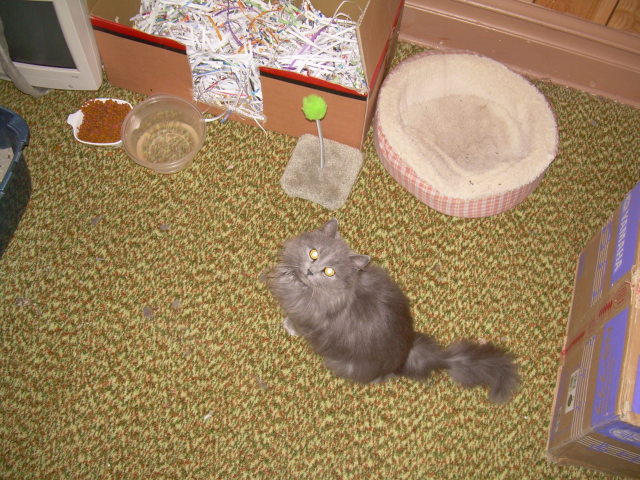 How pregnant is my cat
QuestionQUESTION: I was adopted by a local neighbor hoo
How pregnant is my cat
QuestionQUESTION: I was adopted by a local neighbor hoo
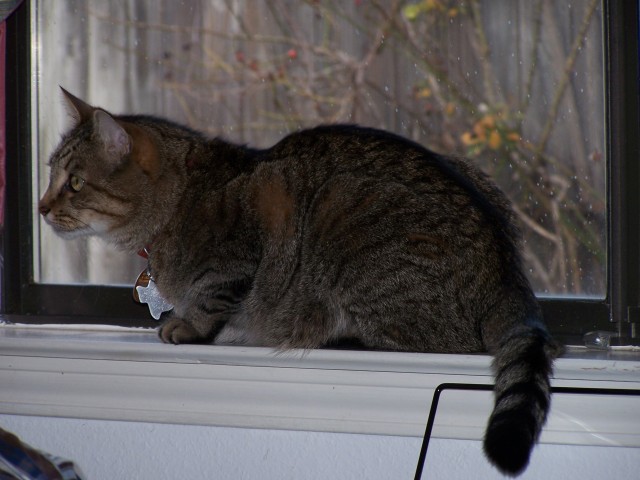 Cat gets angry at tail
Question
Rascal Rasputin
My indoor adult cat seems to g
Cat gets angry at tail
Question
Rascal Rasputin
My indoor adult cat seems to g
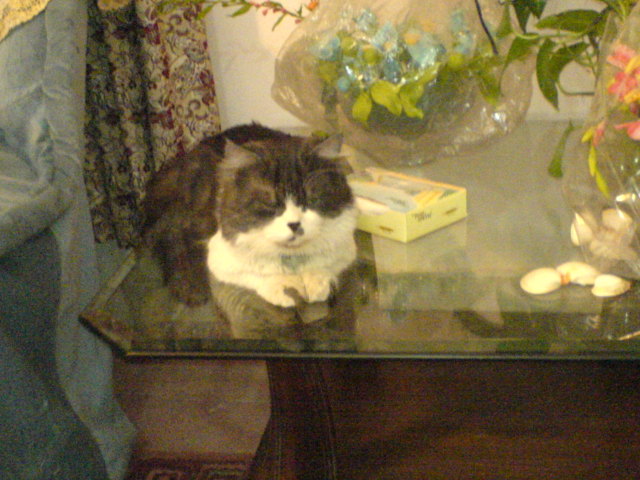 Persian Male Behavioral Issues.
Question
Jimmy
Dear Karen
Hope you are fine. I
Persian Male Behavioral Issues.
Question
Jimmy
Dear Karen
Hope you are fine. I
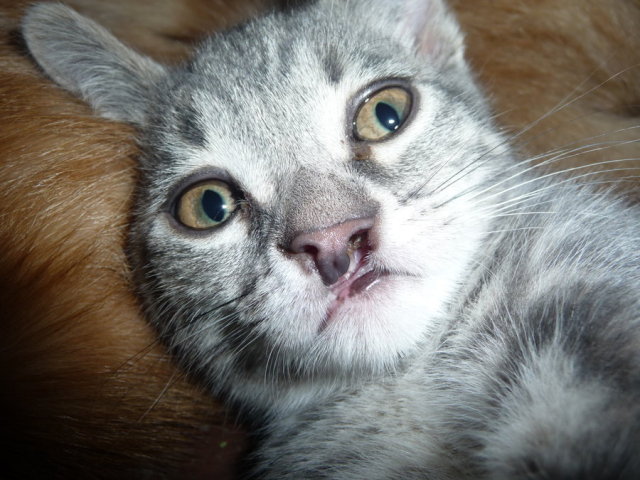 Cleft Lip
Question
Cleft Lip Kitty
Hi Ali,
I have a cat thats 11
Cleft Lip
Question
Cleft Lip Kitty
Hi Ali,
I have a cat thats 11